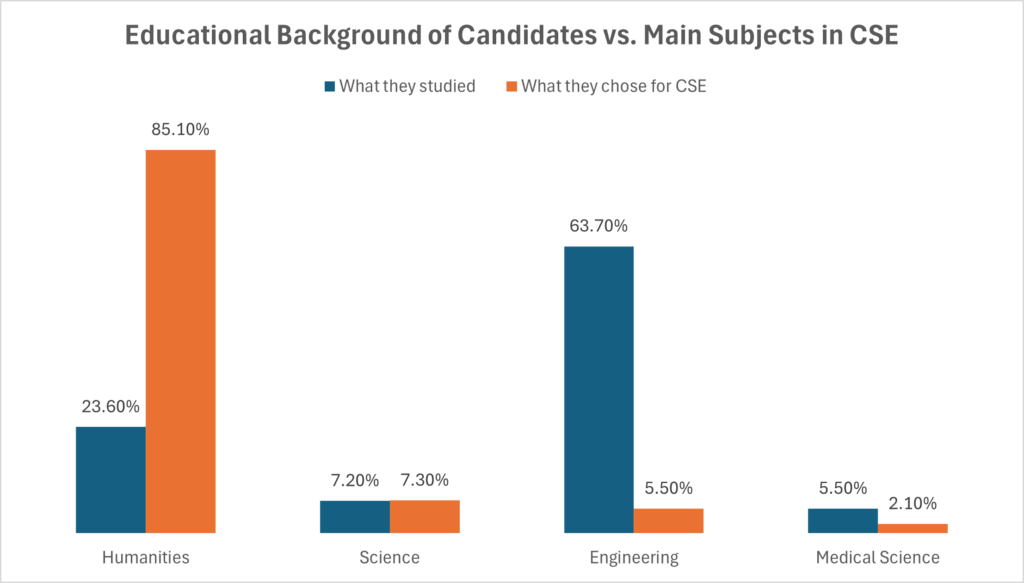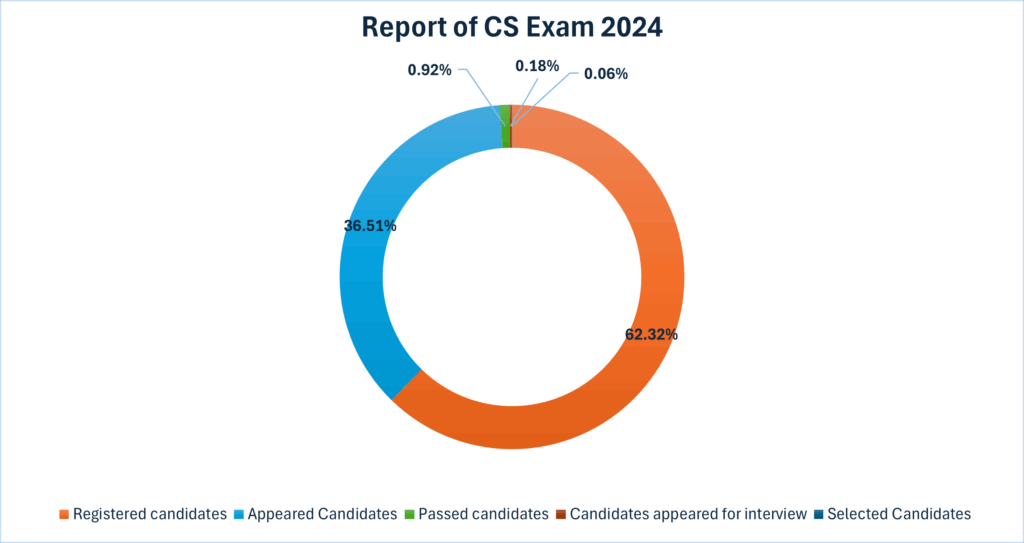Listen to this blog
Every year, lakhs of students start preparing for the Union Public Service Commission (UPSC) Civil Services Examination – one of India’s toughest and most prestigious tests. Notably, many of the candidates who already have their academic background in engineering or pure sciences are now going for humanities as their optional choice.
An article in The Times of India has the interesting facts of the influence for technically trained candidates who now prefer to study such courses as sociology, anthropology, public administration, and political science. The trend reflects a practical approach to such a difficult destination in Indian job market like IAS.
The truth in the figures
The Times of India recently published a study that gives a glaring exposure of the kind of optional subjects that candidates select for UPSC in relation to their respective educational backgrounds.

- The data says that 63.7% of the candidates are from engineering disciplines
- 5.5% of the candidates select engineering as their optional subject
- Humongous 85.1% of the candidates irrespective of their backgrounds choose humanities
- 7.3% opt for science
- 2.1% take medical science
As per the data (2017–2021) 85.1% of the selected candidates have chosen humanities subject as their optional. Interestingly, four of the most prominent subjects were chosen by 56% just, i.e. sociology, anthropology, public administration, and geography. While 76% of the candidates have completed their education in a technical discipline (engineering, science, and medicine), a significant number of them switched to humanities for the main exam.
This change indicates that the people who have been trained in technical fields believe in the advantages of humanities subjects in the CSE context.
But why this shift?
Here are the central reasons why a significant number of engineers and science professionals are opting for humanities instead of their original fields of study.
1. Overlapping course content with General Studies
The significant similarities between the Humanities optional subjects and General Studies (GS) papers are one of the major driving forces. The GS papers are a substantial part of both the Preliminary and Mains examinations. For instance, subjects like Political Science, Sociology, History, and Geography are mainstays of the GS syllabus.
Further, if a student selects an option that matches the GS, he/ she not only reduces the preparation time but also feels more self-confident. As Shakti Dubey (AIR 71, CSE 2018) was quoted, “While I prepared for my optional subject, I could use the information in General Studies Paper IV on ethics and integrity.”
2. Scoring potential
In a way, it can be observed that in the UPSC scenario, many Humanities subjects are considered to be more “scoring”. By having proper guidance, a structured answer writing approach using proper skilled methodology, as well as the correct understanding of the concepts, the aspirers can score more marks in subjects like Anthropology, Sociology, or Public Administration.
These also normally comprise interpretations, critical thinking, and essay-style approaches – domains that smart students can capitalize on to get higher scores.
3. Complexity of technical subjects
Often, the engineering and science optional subjects require in-depth technical knowledge that tends to be neglected for other equally challenging parts of the UPSC syllabus over time.
In addition, technical subjects are marked by a low average score and not much coaching resources are available, which may be why they are not chosen by many, resulting in an unstable situation.
4. Time efficiency
Humanities subjects usually offer a more rapid learning curve. Those preparing in a short time frame of around 10-12 months discover it much easier to comprehend such subjects as Sociology or Political Science than to probe years of engineering concepts again.
This can be particularly beneficial for working professionals who are also trying to balance coaching, self-study, and test series.
Who’s making this shift?
This trend is most visible among graduates of top engineering institutions such as IITs and NITs. These students, who have been traditionally regarded as STEM-oriented, are now shifting to the humanities, not because they are disinterested in their own subjects but out of strategic necessity.
As the article shows, an IIT-B alumnus opted for the subject Political Science to better their scores and increase competency in the interview phase. The decision is usually influenced by performance. According to the data, people taking up humanities have a higher rate of shortlisting.
The individual who placed fifth in the 2024 exam was a Computer Science major and opted for Sociology as an additional subject – not to diverge from a technical degree but to go with the generalist approach of the exam which is broader in scope. In their words, “Science creates objectivity and a way of seeing things as they happen.”
Popular Humanities optional subjects
Some of the most selected humanities subjects among UPSC aspirants include:
- Sociology
- Political Science & International Relations (PSIR)
- Anthropology
- History
- Philosophy
- Geography
- Public Administration
Report of 2024 CSE Exam
This year’s UPSC data further reveals other facts:

- In 2024, a total of 9.9 lakh candidates registered for exams
- 5.8 lakh appeared for the prelims
- 14,627 passed the main exam
- 2,845 became candidates for interviews
- Finally, only 1009 candidates were selected—only a 0.02% of all aspirants
When competition becomes so tough, aspirants are likely to discover any possible advantage. For many, switching to Humanities becomes an opportunity to grab that advantage.
Build a Strong Foundation for UPSC with the Right Degree
The growing trend of UPSC candidates switching from Science & Technology to Humanities is leading to a notable understanding of the fact that succeeding in the civil services is not solely dependent on academic background. The latter involves the ability to integrate with the examination framework strategically.
As a result, many of the candidates are now opting for subjects like Sociology, Political Science, and English as they have a greater overlap with the UPSC syllabus and a proven history of better scores, thus the mainstay of the Humanities is built up from the outset.
If you want to successfully pass the UPSC exam and begin with the right academic grounding, consider the Online BA degree from Sikkim Manipal University, offered by Online Manipal. This program is UGC approved and has specializations in Political Science, English, and Sociology, which are among the major subjects for UPSC exam preparation.
UPSC aspirants can explore your humanities-driving passion through the medium of online learning while having the flexibility and potential to realize long-term success in civil service and beyond.
Also read: Which BA is best for UPSC Aspirants?
Takeaway for future aspirants
Here’s the conclusion for those currently studying engineering or science intending to take the UPSC exams:
- You are not limited by your academic qualifications.
- Study the pattern of the exam, trends in scoring, and the syllabus overlap with the previous exams.
- Opt for your optional subject so that it is backed by a strategy you can work with, an interest you pursue or resources you can easily come by regardless of what’s your degree.
Whether you are an IIT student or a state college student, the message is evident: if you are genuinely committed to UPSC success, then it is time to follow the strategy wherever it leads you even if it requires you to leave your original field behind.
Additionally, note that UPSC looks at clarity of thought, ethical integrity, and the ability to make decisions rather than just subject-matter expertise in the case of one field.
Prepare for your next career milestone with us





















